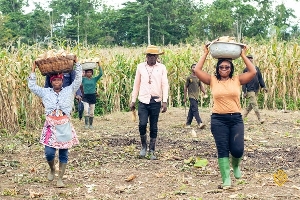- Home - News
- TWI News | TV
- Polls
- Year In Review
- News Archive
- Crime & Punishment
- Politics
- Regional
- Editorial
- Health
- Ghanaians Abroad
- Tabloid
- Africa
- Religion
- Election 2020
- Coronavirus
- News Videos | TV
- Photo Archives
- News Headlines
- Press Release
General News of Thursday, 20 May 2010
Source: GNA
AGRA and IFDC launch programme in the North
Accra, May 20, GNA - Farmers in Northern Ghana are to benefit from a new program aimed at increasing their earning potential. The program, launched by the Alliance for a Green Revolution in Africa (AGRA) and the International Centre for Soil Fertility (IFDC), will create more sustainable markets where farmers can sell their produce for profit. A statement issued by Ms Stella Kihara, Communications Consultant for AGRA, said the three-year project would focus on easing the flow of produce from farms in Ghana's Northern, Upper East and Upper West Regions to commercial buyers and processors of maize, rice, sorghum and soybean in the country.
"As the lead implementer, IFDC would team up with local partners to provide farmers with skills to improve their farm productivity and business and marketing services to ensure sustainable supplies of high-quality produce for industrial buyers," it said.
The statement explained that "The project will directly benefit smallholder farmers, buyers and consumers. By linking with buyers before production, farmers can be assured of regular farm incomes. Traders, processors and large retailers will also benefit because they will be able to obtain reliable and regular supplies of quality produce." According to the statement, AGRA and IFDC would partner with several local organizations to strengthen capacity of farmer organizations. "The aggregating organizations will serve as an intermediary between farmer groups and buyers at the top of the supply chain. These include the Savanna Farmers' Marketing Company Limited, a farmer-owned marketing company with a network of 8000 farmers, OFRAM Enterprises and nearly 50 community women's rice processing groups in the region.
"Many Ghanaian farmers lack access to reliable markets where they can sell their produce at a profit. This makes farming an unattractive investment for most farmers. Functional markets are absolutely essential to making investments in agriculture more appealing to farmers. Farmers have no incentives to grow more food if they do not have a market for their surplus."
In added that agriculture was the main engine of economic growth in Ghana, and smallholder farmers represented 80 per cent of farm production and that AGRA was working to improve smallholder farming in Ghana through programmes and partnerships that focused on improving farmers' access to good seed, fertilizer and sustainable farming practices, while increasing farmers' access to credit, crop storage and markets. "The Northern Region, which represents 41 per cent of Ghana's total land area, has been identified by the Government of Ghana and AGRA as a breadbasket area because of its high production potential for staple food crops such as rice, maize, sorghum and soybeans and large rural farming populations. Yet the north is also the poorest region, with nearly two-thirds of the population living in poverty."
It said very few projects addressed the need to ensure that the increased production found its way to the markets without adverse effects on prices and incomes of farmers and other stakeholders in the value chain. The statement added that the country could transform its smallholder farming to a profitable and sustainable enterprise if it focused on breadbasket areas.
"Strong partnerships and strategic planning that bring improved seeds, access to finance and farm management skills to farmers could increase yields significantly. If you couple these productivity improvements with greater market access for farmers, Ghana could transform itself into an exporter of a crop like rice, and free up US$500 million now spent on imports," it said. 20 May 10










